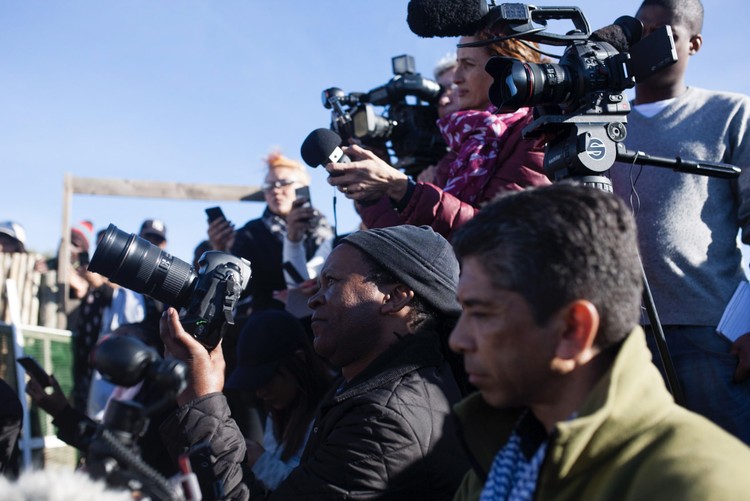Community newspapers cry foul over copyright claims from Reuters, AFP
Association of Independent Publishers says this is “predatory behaviour”

Smaller publications are often billed for huge amounts by agencies representing big news organisations for allegedly using their copyrighted photos without permission. Photo: Ashraf Hendricks
- Small media publications have been receiving copyright claims from an agency representing Reuters and Agence France-Press (AFP) attempting to charge them large fees.
- The use of copyrighted images is usually made in error or under fair use principles.
- Small publications operate with small budgets and are mostly unable to afford the fees.
Several small South African media publications are complaining about “bullying” and “trolling” from a copyright compliance company acting on behalf of big media houses such as Reuters and Agence France-Presse, and demanding large fees for copyright breaches.
Quan Dambuza, editor at Pondoland Times, received an email from PicRights asking him to pay R15,261 for using images that belonged to Agence France-Presse.
He immediately removed the pictures from the website and responded to PicRights, asking for a discount. R15,261 is 50% of Pondoland Times’ monthly budget.
Eventually, PicRights agreed to a fee of R1,500, which Dambuza paid. Pondoland Times has one full-time employee and six part-time employees who earn stipends of R1,500 a month. They publish 5,000 copies a week.
An editor of another small community publication, who preferred not to be named, was asked by PicRights to pay R22,220 for using images belonging to Reuters. But the images were sourced from the South African government’s news website. On the website, it says that “media are welcome to utilise all stories, pictures and other material on this site as well as from our Facebook and Twitter accounts, at no cost”.
The editor refused to pay and claimed ignorance and lack of money. He didn’t hear from PicRights again.
The editor of Muslim Views, Farid Sayed, was asked to pay R4,500 for using two Reuters images in his monthly newspaper. One of the images was from an advert submitted by a client. PicRights offered a discount of 15% after Sayed said he did not have the money to pay.
Muslim Views has no full-time reporters and a monthly editorial budget of R9,000, to pay for images and freelance reporters.
Mpumalanga Press was also sent an email by PicRights, asking them to pay for using an image that was used under the Creative Commons attribution.
GroundUp itself was asked by PicRights to pay for two images: a head-shot photo of Helen Zille, taken from the DA website, which we used as Fair Use but apparently belonging to Reuters; another taken by one of our own photographers and several emails had to be exchanged to prove this. PicRights wanted R5,300. We refused to pay.
Kate Skinner, executive director of the Association of Independent Publishers (AIP), says that this is predatory behaviour. “No one is saying that copyright is not important but generally these photos have been used in error and thus leniency is required,” she told GroundUp.
“Small independent publications are playing a critical information role in townships, small towns and rural areas. But they are not robust. Many are struggling to survive,” she said.
Skinner also says that the AIP will engage with members on how to access copyright-free photos. She has asked her members to refer PicRights to the AIP in the future.
Neither Agence France-Press nor Reuters responded to GroundUp’s questions. We called the number on PicRights’s website, but no one answered. No email address was listed on its website.
Support independent journalism
Donate using Payfast

Don't miss out on the latest news
We respect your privacy, and promise we won't spam you.
Next: No school fees? Then no matric dance!
Previous: Protesters sleep outside Constitutional Court, demanding apartheid reparations
Letters
Dear Editor
We at the Institute for African Alternatives (IFAA) were also hit. Earlier this year, the same organisation demanded an excessive and punitive fee for our use of photos in our journal, New Agenda, that they asserted were owned by Reuters and Agence France-Presse (AFP).
We fully respect the need for copyright legislation to protect the rights and interests of photographers, and we explained that these photos were obtained from open sources that had not credited Reuters and AFP. We also explained that we were unable to pay the fee they requested.
PicRights closed the case in recognition of our financial constraints.
We would like to appeal to PicRights to reconsider their policy on charging NGOs and other non-profit bodies that are already struggling to stay afloat in difficult times. The alternative, independent media is facing huge challenges in pursuing its mandate of informing our readers by exposing assaults on our democracy and speaking truth to power.
We further appeal to these large, commercial agencies to support the independent media by making photos available to non-profit media for a nominal fee. Why not create a commons licence for material that community organisations could access for free? This could be conditional on the publishing of full recognition of PicRights’ and their clients’ support for an outspoken, effective and independent media, thereby demonstrating that they put the pursuit of the truth before the pursuit of profits.
[Editors' note: Are the request of the writer the original letter has been substantially amended.]
© 2022 GroundUp. This article is licensed under a Creative Commons Attribution-NoDerivatives 4.0 International License.
You may republish this article, so long as you credit the authors and GroundUp, and do not change the text. Please include a link back to the original article.
We put an invisible pixel in the article so that we can count traffic to republishers. All analytics tools are solely on our servers. We do not give our logs to any third party. Logs are deleted after two weeks. We do not use any IP address identifying information except to count regional traffic. We are solely interested in counting hits, not tracking users. If you republish, please do not delete the invisible pixel.
